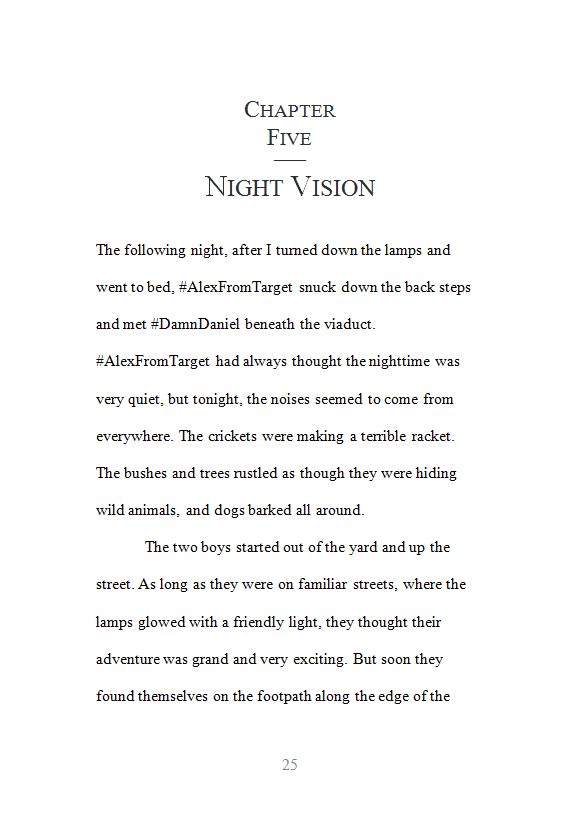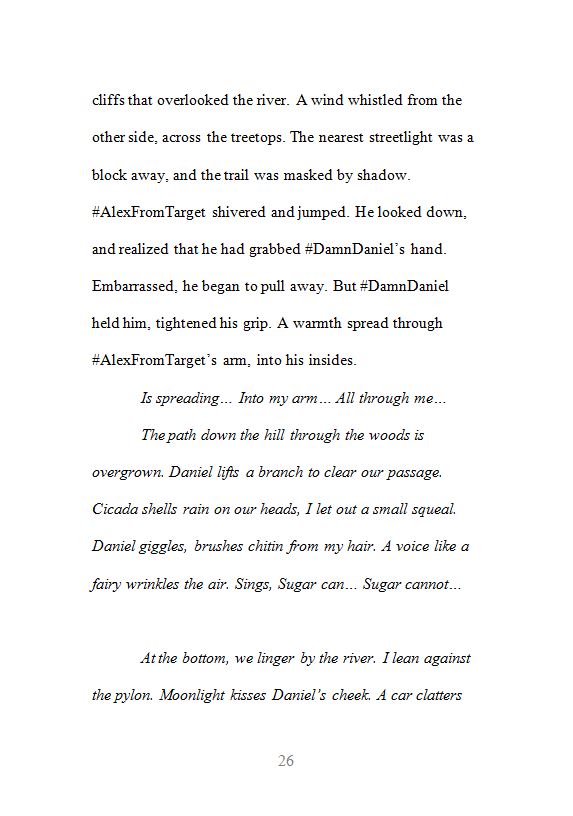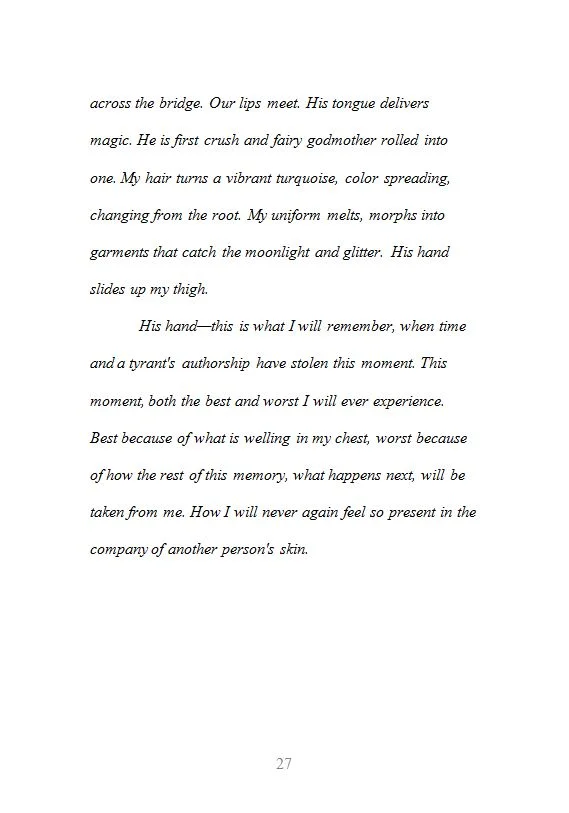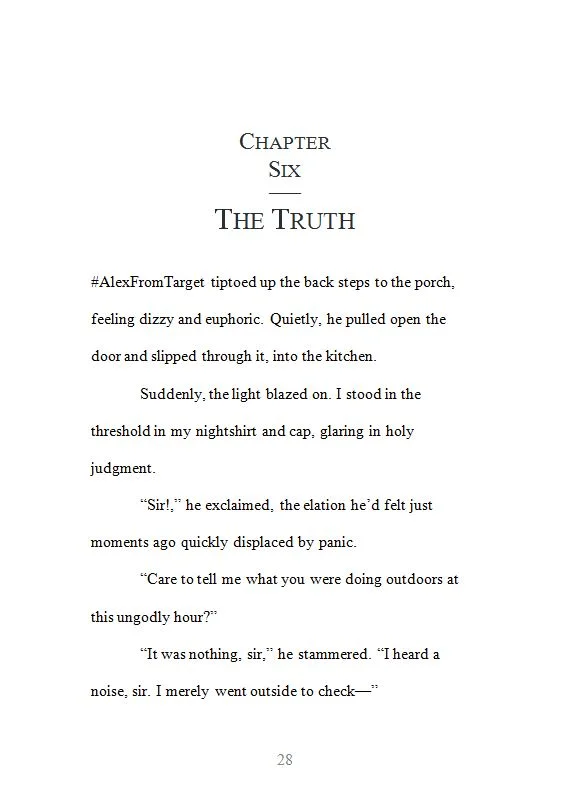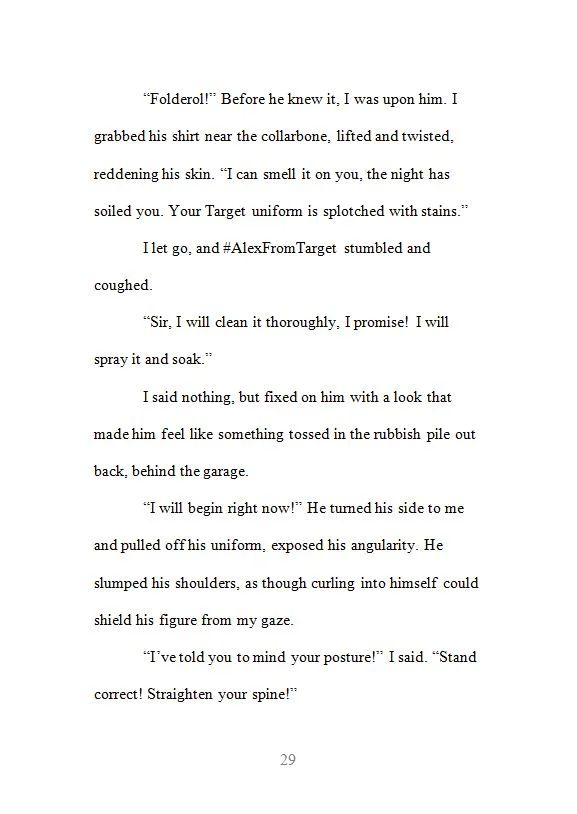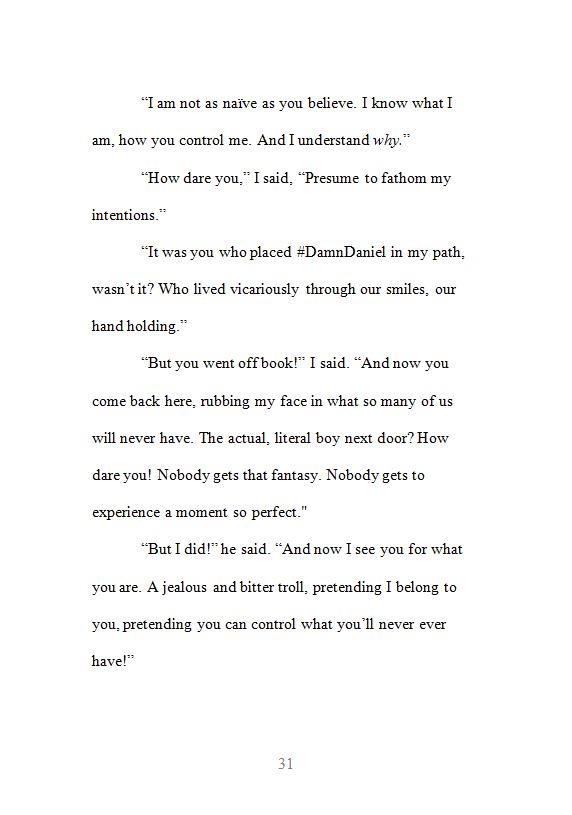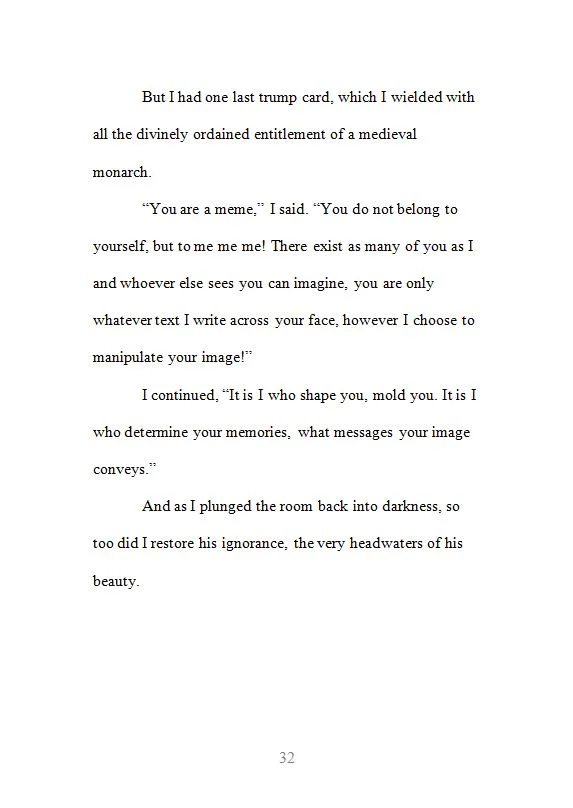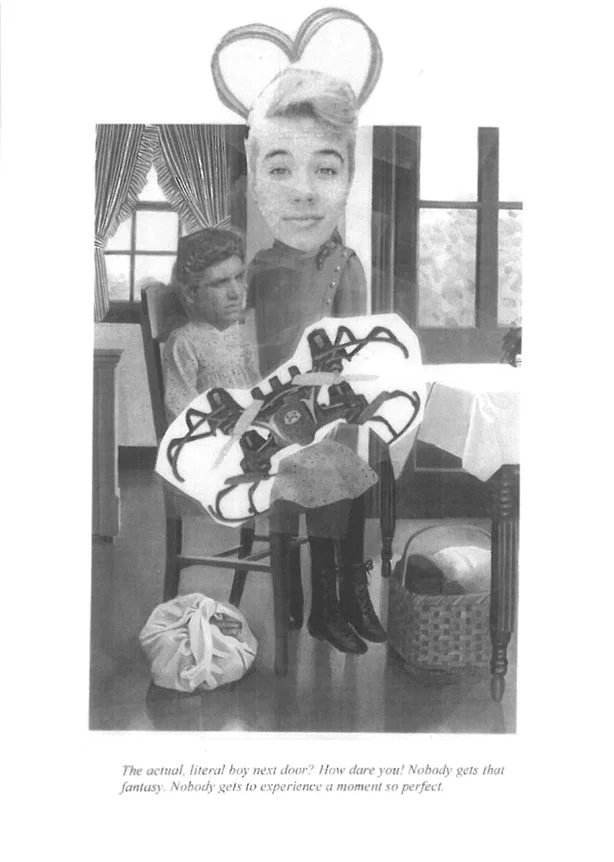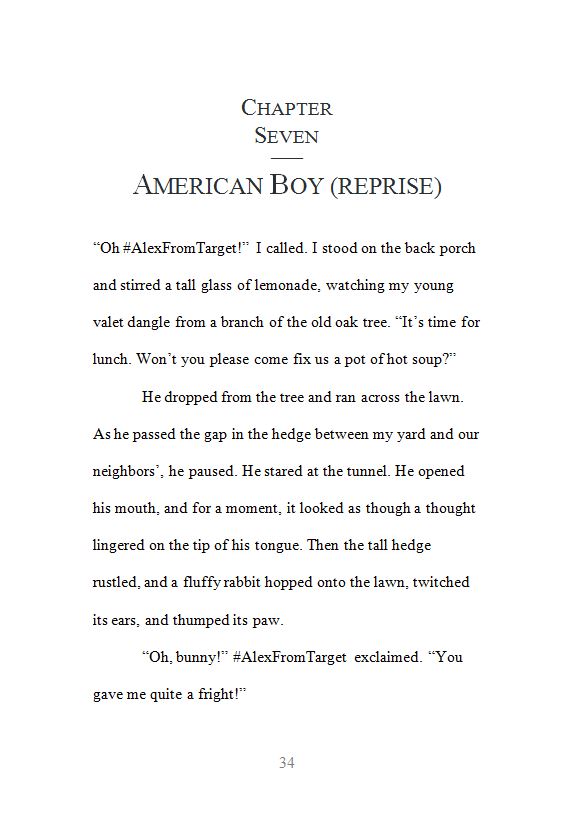This research is recorded in the proceedings of the Amnesty International chapter, E.T.H.S., 1987. In a story about student activists, a bomb is going to go off. In a story about vampires, someone's going to bite.
We often wondered about the Transylvaniess. What she ate when not drinking blood, what size her coffin, how broad the wingspan of her bat familiar. What she did after school, because she hadn't signed up for extracurriculars. No one had seen her hanging out at the Burger King parking lot or browsing through records in the back of Second Hand Tunes. We wondered if we would look up and see her Transylvanian family silhouetted against the night sky — even the little one they'd enrolled in kindergarten and the old one who sat on a park bench drinking cold tea — flying off to the pink light of Chicago to feed on the drunks passed out on Rush Street and the homeless sleeping in their cardboard boxes on Lower Wacker Drive.
She had the saddest eyes we'd ever seen. Irises a soft brown, pupils vanishing as if they were designed for night vision, like a cat's. Eyes that had seen too much because the aperture opened too wide. The whites of her eyes were skim-milk blue. There were plush black-blue bags spreading beneath them, because she never slept what with being a vampire and having to be at school days.
She wasn't like the West Indians, shivering in their tatty cardigans, who swore they'd never be at home here. Yes, her blood ran cold underneath her ghastly porcelain skin, but wasn't she replenishing it nightly? Her eyes drooped at the corners, with an overly defined epicanthic fold that gave her the look of a lizard longing for the sun and made her stand out all the more at the table of Asian immigrants she sat with at lunch.
The Korean girl who'd been here the longest translated for her. The Transylvaniess would whisper something through her fangy teeth and the Korean would shout it at us until she thought we understood.
"She say, she can't make history project after school. She must to go home."
"She say, she don't like potato chips. They hurt her teeth. Thanks anyway."
"She say, she can't swim. So she can't be on your water polo team in gym class."
"She say, Transylvania is too a real country."
The Transylvaniess shuffled along in her bulky Eastern European shoes, her back bent due to the weight of her voluminous pack, her sad eyes on the floor as if she thought she might trip. Or that someone might trip her. Foreigners were like permanent freshman. We were sympathetic because we were once freshmen, too, but because we knew the only cure for us was to become older, we knew the only cure for them was to stop being foreign.
They had her mainstreamed only in gym. She wouldn't suit up. Illinois mandated four years of daily gym. Maybe it was different in Transylvania, but this was Illinois. The only other class Illinois valued as much was English. There were second-year seniors whose schedule consisted entirely of English and gym. The Transylvaniess allowed herself to be herded into the locker room, but while we changed, while we scoured ourselves with lotion to prevent the horror of ashy legs and shellacked our hair back in place in front of the hazy mirror after we'd pulled the gym uniform shirt over our heads, she leaned against the mirror and watched us, her lizard eyes unblinking. Her lank hair was plastered to her pale forehead. Her dowdy brown corduroy dress clung to her skinny frame. We knew it wasn't coming off, that we would never see what vampires went in for when choosing underwear.
We all knew how not to look for too long, not at the girls with enormous breasts or the ones in various stages of anorexia. Or the ones with polished, shrunken skin on their legs from childhood scalding accidents, or bruises the size of a boy’s fist. Cigarette burns on arms of kids who didn't smoke. Or hickey necklaces, each one a dark, lustrous pearl of capillaries, or girls whose formerly flat stomachs bulged once they were revealed in bras and panties instead of the baggy sweats they'd been choosing lately.
She followed us out into the gym. Because she was so thin, her corduroy dress that on any of us would have squeaked didn't. There was nothing for the fabric to rub against. The dress covered her knees, so we didn't know how bony they might be. Her ankles were covered by wool socks that ran to meet the dress' hem, leaving only a hint of a patch of that blanched skin. While we choreographed dances to Janet Jackson's Rhythm Nation album, or ran dribbling drills, or practiced volleyball serves until our wrists ached and we begged Ms. Shaw to let us start a game, the Transylvaniess stood in the corner and watched us, her arms folded across the corduroy. She never sat down, the way we did when we didn't suit up, crossing our legs beneath us or sticking them out in front until Ms. Shaw shouted we were just asking for accidents. The Transylvaniess never walked laps around the gym, the way that girls who had their periods did for credit. Blood made us anxious. It was an era of great worry over the exchange of bodily fluids. We watched her watch us. She was in street clothes. It was permitted, demanded even. It was like the Transylvaniess was on a permanent period, a permanent state of blood brimming out of control, blood lust at her fingertips.
When the bell rang, the Transylvaniess didn't get on the 202, 203, or 204. The buses were only a quarter with a student ID, so it couldn't have been that she didn't have the money. Unless her family only had gold coins stamped with profiles of medieval princes? She didn't walk home with the Korean. The Transylvaniess walked alone, all the way from the high school's Gothic hulking structure on Dodge Avenue to a shabbily elegant 1920s apartment building off Main Street, past Ridge Avenue.
The apartment building had turrets and peaks and bay windows; we didn't think it was a coincidence that both buildings the Transylvaniess spent her time in looked like castles. Evanston was full of things built to look like something they weren't, built to look older, and we wondered if the Transylvanians chose Evanston because at least it looked old, or because the sham lives they were required to lead as vampires went easier in a town designed to deceive.
We knew that the apartments inside the fake castle were cramped, the biggest unit only two bedrooms and the bedrooms just wide enough for a bed and dresser if you didn't mind having to sit on the bed to pull open the drawers, with windows onto a narrow courtyard that never saw sun. The Transylvanians were living in one of those apartments, all six of them. No wonder they had to get out at night.
How did she move outside during the day? Carefully, her parka hood pulled out as if it were the prow of a ship, her socks pulled up to cover the last patches of skin, ratty woolen mittens no matter what the weather. The Transylvaniess never stopped to admire lawn ornaments or get a snack at a corner store. She didn't stop at lights, either. She looked for cars once and then darted across the street, sometimes catching her clumsy shoes against the curb. We clocked her taking 45 minutes door to door. She vanished into her building. We waited for her to return, holding the little one’s hand. The little one skipped in place while they waited to cross the street.
The little one was almost pretty, the same sad eyes peering out of a pointy face, and the awkward teeth were charming in someone still working on her baby teeth. The Transylvaniess smiled down at her. We'd never seen her smile before, and it was terrible. Her eyes closed up; her fangs were revealed.
They crossed the street into the park to meet the old one who waited for them all day on the bench, wrapped in a blanket and sipping tea from a thermos. She wouldn't share her bench with anyone else. If someone else was there first, she stood next to the bench first sighing, then grumbling in Transylvanian and baring her remaining teeth until she drove everyone off.
They sat together, kicking their heels against the dug-in dirt under the bench, staring at the gnarled elms lining the park. The old one pulled out a packet of European digestible biscuits from her torn trenchcoat pocket, and they chewed through the contents. The old one spat whenever teenagers walked by. She didn't like other old people, either. Babies in strollers caused a strange cooing in her throat; it might have been more of a croaking. It was impossible to tell if she liked babies or hated them most of all.
We waited for the Transylvaniess to push the little one on a swing, climb up with her to the ship's mast or castle's turret, at least start a wood chip war, but they sat as placidly as the old one did. They roosted there, whispering to each other in their nasal, staccato language, blinking their mournful eyes, red noses running. Once Evanston's old-fashioned street lamps flickered on all at once all over town, they stood up. They shook the crumbs of biscuits off their laps and ground them into the dirt with their heels. Crossing the street against the traffic light, they disappeared into their building.
We tried, but there was no angle to get a good view into their apartment, even from the buildings across the street. They kept their shades drawn and the lights largely off, as if they had sophisticated vision, infrared maybe. Either that, or those bony legs must be covered in bumps as they ran into their oversized Transylvanian furniture. We didn't know whether they shipped it from Transylvania or bought it at the Salvation Army, but we had informants who watched them move it in. It was the kind of furniture that could have secret compartments. For vampire coffins, for hoarding the musty earth of Transylvania that would restore them as they slept.
If they slept. These Transylvanian vampires seemed to have adapted so that the rays of the sun did not fry them instantly, for the Transylvaniess walked to and from school, the old one sat in the park, the young one waited in full sun for her school bus, and they all sat in the park together until darkness fell. Were the rules different for the young and old? The parents and the older brother left the house mornings when it was still dark, and returned at night in darkness. What would they do when Daylight Savings Time ended?
*
We recruited the Transylvaniess for our E.T.H.S. chapter of Amnesty International. There was dissent. Luisa, born under Allende and smuggled out of Chile under Pinochet, was uncomfortable writing Urgent Action aerogrammes next to a vampire. But we already had Pieter, our white South African, native Afrikaans speaker. Reilly, our IRA supporter, was all for political redemption, and thought we were ready for a Transylvaniess. Sometimes we resented Luisa and Reilly. Some of us thought we had stories as good as theirs worth telling. Plus, Luisa was a baby in 1973. What she knew, she knew from listening to the stories of others. We were good listeners, too.
During meetings, our faculty advisor Mr. Piper sat in the back grading papers, looking up when Reilly or Luisa said something outrageous. His college experiences volunteering for Freedom Summer had radicalized him, but he also had gone to college on a football scholarship. There was a part of him that couldn't understand why we ditched pep rallies to browse at Second Hand Tunes. "You could have school spirit and world spirit," he told us.
We couldn't figure out how the pep rallies were supposed to be us acting locally, as they reminded us more than anything else of a stadium full of Fascists, Leni Riefenstahl at the camera. The fight song was, "E.T.H.S., We will fight for you, for the right to do, everything for you," and that wasn't a right we wanted to fight to win.
When the Korean and the Transylvaniess peeked around the door, Reilly ushered them in. Chan, our Cambodian killing fields refugee, soft-spoken, tiny from years of malnutrition, a dark mark on her throat from years of playing championship violin, passed them aerogrammes and lent them Hello Kitty pens. "I really need these back," she said. After her Cambodian childhood, Chan was especially fond of private property. The Transylvaniess turned the pen in her claw hands.
Luisa called the meeting to order, banging her fist against the desk. There was a touch of Castro about her, solidity to her movements, a tightening of her jaw. She brushed her dark braid off her shoulder and tugged at the red scarf around her neck. Pieter slouched in his chair, reviewing atrocities committed by Nicaraguan death squads. Pieter wasn't albino, but there was something about him that made us think that maybe he should have been. He was thin, with floppy limbs like a rag doll that made him lurch about awkwardly. His hair was urine yellow, his face and arms so full of freckles he was red, not white.
Chan said politely to the Transylvaniess, "Perhaps you could brief us on human rights in Eastern Europe?" Chan was already responding to the Urgent Actions, her frilly handwriting flowing across the page. Chan and Luisa competed to see who could write more letters, but many weeks Pieter, indifferent to them as he burrowed into his desk, indifferent to what city he was in, what country, wrote the most. Mr. Piper knew not to commend him, knew that Pieter didn't want to be commended but punished, maybe by Reilly, his only friend, maybe by Luisa in some vaguely sexual way, a Kafka fantasy of a girl dressed up in army fatigues barking commands at him while he wrote letters until his fingers bled.
If we thought the Transylvaniess would answer our questions simply and smoothly, we underestimated her canny nature, her clever paranoia, the wiles of monsters and immigrants. The Korean bounced in her chair. The Transylvaniess scowled. The Hello Kitty pen was leaking blue ink. Her fingers seemed traced in surplus veins. When she leaned over to whisper something to the Korean, we caught a flash of her dead tooth, a gray moldering next to her right fang usually hidden by the sneer of her upper lip.
The Korean said, "She say, maybe something more specific?"
Luisa tried, "You could talk about Transylvanian dissidents? Transylvanian prisons?"
"She say, food is rationed. Electricity, too. It's always cold. It's like everyone is dissident, because everyone is punished." We imagined a nation of citizens huddled in their cold, dark apartments, waiting for vampire visitations, waiting to feast on their neighbors, waiting for their neighbors to feast on them. The Transylvaniess fluttered her sad eyes at us.
The Latvian twins stared at each other, arching their blond eyebrows in their telepathic language. They were fraternal twins, but they looked alike anyway, both sporting a Prince Valiant bob and Pixies t-shirts, the girl flat-chested, the boy with generous hips. The girl twin asked, "How did you get out?"
The Transylvaniess shifted on her chair. The corduroy squeaked. "Uncle in Chicago."
The boy twin insisted, "Your family must have had connections. Paid something. Nobody gets out for free."
"Luck," the Transylvaniess said.
The boy twin pushed, "Nobody gets out by luck. You must have done something."
"Luck!" shouted the Transylvaniess, her fangs revealed.
"Hey. Hey, now." Mr. Piper waved from the back of the room. He had the gentleness of a big man who'd been fighting the intimidating impression of his size his whole life. Nobody, ever, had really messed with Mr. Piper. We all were suspicious of his sympathy.
"People at least have expectations of you," the Latvian girl said sulkily, her hair in her eyes as she tugged at split ends. "Of Transylvania. Nobody knows anything about Latvia."
Luisa said, "Come on. It's hard enough being the new kid without having special problems."
"Special problems?" the Transylvaniess asked. "Special? What do you want me to say? That I've come to suck your blood? It's what you believe?" She met our eyes, one by one, surveying her crowd, her prey. We stared back at her. We did believe it, but no one wanted to say it. Not even Reilly. She smiled at us scornfully.
"Hey, everybody," said Mr. Piper, but before he could finish the bomb in the Haymarket diorama blew up, scattering plastic men waiting to hear the anarchists speak, a plume of pink smoke rising. In the next shoebox over, the Hull-House Devil Baby, a plastic trinket from a King's cake, rolled to freedom from its toothpick crib.
"It was an accident, Mr. Piper, I swear," said Reilly. "It wasn't ever supposed to go off. It was a dud."
Luisa said, "Jesus, Reilly, what you were thinking?" She put her arm around Chan to stop her from shaking.
"Reilly, a word?" Mr. Piper opened the door and bowed to Reilly to go first, that overly polite gesture of teachers at their angriest and most sarcastic.
But it wasn’t Reilly who set it off. It was Pieter. Chan saw him do it, and the Latvians. He had matches in his bag from the Lucky Platter. The Transylvaniess and Pieter sat in silent camaraderie. We think she knew Pieter had done it for her, to get her attention, get us to stop talking. We never tired of listening to ourselves. She nodded in his direction, but that could have been a Transylvanian way of saying hello. Pieter's face was entirely a blotchy red. He ran his hands through his thatchy, awful hair. Only a vampire could love him.
Reilly wouldn't talk about what Mr. Piper said, but he was happy to discuss the next turn of events: the bizarre double date of Reilly, the Korean, Pieter, and the Transylvaniess. When the Korean and the Transylvaniess exited E.T.H.S. arm in arm, leaning to the side due to the weight of their backpacks, Pieter trailing behind them because he was shy but determined to stay in the orbit of the Transylvaniess, who had a capacity for violence above and beyond anything Luisa could dish out, Reilly was there with his beat-up Rabbit. He offered them a ride home, but he also offered them a ride into the city. "Don't you just want to get out of here?"
The Korean and the Transylvaniess wanted to call home from the payphones, but Reilly wouldn't let them. "Wouldn't they say no? Don't you want to say yes?" Pieter didn't have anybody to call.
Reilly drove them into Chicago, past the gray monuments of Calvary Cemetery on the left and the gray waves of the lake on the right. Past the 400 Theater, with its midnight showing of Rocky Horror. "We should take you," said Reilly. "Our own sweet little transvestite from Transylvania." The Transylvaniess grunted. Past the senior citizen towers on Sheridan, where seniors desperately waited at lights to cross with their walkers.
Inside the Rabbit, they listened to Reilly's mixed tape. The Replacements: We'll Inherit the Earth. The Smiths: There Is a Light That Never Goes Out. Joy Division: Love Will Tear Us Apart. The Beastie Boys: Brass Monkey. The Clash: Lost in the Supermarket. The Pogues: Streets of Sorrow/Birmingham Six. Eric B and Rakim: Paid in Full. The Pixies: Where Is My Mind. The Korean bopped her head to the music. The Transylvaniess sucked her teeth together.
On to Lake Shore Drive, where the Korean said she felt like she was flying. Her hair got into Reilly's eyes and he thought he was going to have pull over. Past the water giving the illusion that you could sail out of Chicago, that we weren't stuck here, land-locked: a lie like the antique features of Evanston. None of us were going anywhere. We'd gotten here from a great distance. To the wall of skyscrapers at the Oak Street Beach, the spot on the Drive where it feels as if you're going to crash into the city head on and it would be magnificent.
They exited the Drive at Jackson to cut over to Buckingham Fountain. They parked illegally. Reilly led them, the girls together, Pieter still trailing behind, as if he hadn't been invited, as if he were a spy. The Fountain was Reilly's make-out point. Most romantic guys would go up to the Bahai Temple in Wilmette, or drive through the winding ravines of the richest North Shore suburbs, and there was always the Burger King parking lot, but Reilly always said nothing was as impressive as a city, and if he couldn't take her to Dublin, Chicago would do.
The Transylvaniess breathed deeply as she and the Korean stood at the Fountain's base. Reilly had never seen her so relaxed. Maybe the ornamental architecture reminded her of Transylvania. Pieter stood off to the side, kicking at the little pink pebbles.
It was dusk. Reilly talked the Korean into walking around the Fountain to examine the bronze monsters circling the basin. She agreed, slipping her hand into his. So Reilly, who doesn't kiss and tell, wouldn't tell us what happened then, and wasn't able to tell us what the Transylvaniess and Pieter were up to, although they must have appeared as two thin silhouettes against the violently pink sky, standing by the pink marble fountain as it gushed forth like blood from a severed artery.
When Reilly and the Korean returned to the car, Reilly overheard Pieter murmuring, "Such extravagant waste," and the Transylvaniess agreeing, "Such a squandering."
On the way back, Reilly and the Korean talked about music. He explained the lyrics to the songs on the mixed tape. The Korean regularly got lost in supermarkets. The lights in Chicago never do go out. "Your Ireland," she whispered during the Pogues. They didn't hear anything from the backseat. When Reilly turned around, he saw the Transylvaniess, carsick, her head craned toward the open window, and Pieter asleep with his head in her lap.
*
Pieter and the Transylvaniess were now a couple. They were the kind of couple that we found most nauseating, couples with dingy hair and pimpled faces, always too fat, too skinny, too tall, too short, and mismatched so that two fat ones, two tall ones never seemed to find each other. The kind who leaned into each other at lockers and chewed on each other's maws until they internalized every last vestige of lip gloss and chapstick. The kind the superintendent called "cheap and desperate" over the loudspeaker when he chastised them for "romancing in the halls," the kind of couple that the resulting "If you're cheap, I'm desperate" and the "If you're desperate, I'm cheap" t-shirts were made for. We didn't enjoy watching the attractive couples, either, but at least there seemed to be a reason beyond biology, rooted in aesthetics, for their rutting around.
We didn't want to see the pointy nails wrapped around Pieter's blotchy neck. We didn't want to notice that Pieter's hickeys were purple against his red freckles, that the Transylvaniess remained unblemished but that her skin had started to glow as if it was lit. We didn't want to see Pieter pressed against the Transylvaniess' locker as she used her nimble tongue, her fangs sheathed behind the pink, pulsating muscle. We didn't want to see them on the bench, their hands furtively inside each other's coats.
Once Pieter and the Transylvaniess were together, her eyes crinkled up with strange little smiles. Her nose stopped running, although she still dabbed at it with a faded, flowered handkerchief. Her spine seemed to straighten as if Pieter's blood kept her aligned. She didn't watch her clunky shoes when she walked, but looked straight ahead as if she was looking for him. This new happy Transylvaniess was what inspired Ms. Shaw to enforce her participation in physical education.
It didn't matter any more whether the Transylvaniess had a gym uniform. During the swim unit, everyone was required to wear an E.T.H.S. swimsuit. For the girls: shapeless black suits boiled in vats, elastic that had lost its tension. For the boys: Speedos made of the same material. Loincloths would have been more suitable.
Worse than the suits was waiting in line naked to get them. Stripped beneath the fluorescent lights of the locker room, we shifted our weight from one foot to the other to cover what we could, arms folded across our chests or fingers braided around our genitals depending on what we chose to protect. When we reached the front of the line, we had to tell the shriveled lady at the counter what size we thought we were. She peered at us through the bifocals sliding down her nose. Pitching her voice to echo down the tiled corridor, she would correct us loudly if she chose. She took her pair of substantial tongs and dug out a steaming suit from the pile behind her. She dangled it before us. We had to take it, no matter what condition it was in, no matter what size. Hopping back down the hall, using the suit to cover what we could, knowing that our backsides were open to countless humiliations, we made our way back to our lockers and put the suit on.
The myopic amongst us worked on the theory that if you couldn't see anyone, they couldn't see you. The suit pilled up at the area we least wanted others to notice. We exited the harsh light of the locker room and descended the slippery steps into the atrium with its weird illumination of a constant, early twilight. We were divided into those who could handle the big pool, and those who couldn't. The small pool held swim classes for little kids on weekends, and we knew that it was a pool full of piss. To a certain extent, our swimming ability coordinated with how far west we lived, how far away from the lake, how much money we had.
Transylvania is a land-locked country. The Transylvaniess said she knew how to ski, not how to swim. She refused to wait in line, not even clothed, not even when Ms. Shaw tried to drag her over. She held up her hands beseechingly, as if she didn't understand, but we knew she was pretending. Her English was good now; that was one class she would pass. Ms. Shaw ended up tossing a suit straight over to her locker.
The Transylvaniess was the only one who looked dignified in the suit, maybe because in its bagginess spanned across her slight frame, it didn't look all that different from a shorter version of the corduroy dress. She looked like a Hollywood starlet from the silent era, the black suit, her white skin, her hair plastered to her forehead in curls because of the humidity. She arched one trim ankle toward the pool, gracing the water with her toes, then pulled it back.
Ms. Shaw begged, "Please, show us you can swim!" Ms. Shaw’s suit was rainbow-colored, a Ziggy cartoon on one breast. Her frizzy green hair was pulled back in a ponytail that bounced as she swam towards the Transylvaniess. "Please!" The Transylvaniess put her face in the water, leaned in to float, and sank like a stone. Ms. Shaw pulled her out, patting her back as water sputtered out of her. Water rushed into the suit to give her a momentarily voluptuous figure. She was assigned to the piss pool.
Pieter had been assigned to the big pool. In South Africa, he must have had a swimming pool, must have done laps as much as he liked, then sat in the sun flipping through comics while servants brought him tea. Pieter was more at home in the water than on land, cutting through the liquid with vicious kicks. In the pool’s glow, his hair softened to a whitish blonde, and his ruddy skin seemed healthy against the shifting blue.
Ms. Shaw was teaching us a synchronized swimming routine that started in the piss pool with rudimentary steps that could be done by someone standing tip-toe in the water. The baby swimmers swung their arms out in the direction of the big pool, hailing the superior swimmers, bowing their heads, tucking their chins in to their necks as the action passed on. In the big pool, in the deep end, Esther Williamses of both sexes, of all races, fanned out in every direction, their bodies elongated, all of them opening up into a flower, their kicking legs petals in the breeze. A chrysanthemum, really, a human chrysanthemum. When Ms. Shaw described it, Pieter blushed and the Transylvaniess' eyes flashed red. We thought they were thinking Buckingham Fountain, water turned into a flower. But probably they were thinking about a far more intimate moment, one we entirely would not like to know about. None of us would be able to see the ultimate flowering of the human chrysanthemum, except for Ms. Shaw, because we would be in the pool, and the flower was designed to be seen bird’s-eye view. We thought of the spectacle of pep rallies, of gymnastic displays in totalitarian countries. Ms. Shaw told us someone from the AV club was going to film our final performance.
In a nod to the individualized roles that American spectators preferred, Ms. Shaw was developing a solo. Pieter was the honeybee courting the collective flower. He would dive down in the water, skirting our kicking feet, holding his breath so prodigiously he scared Ms. Shaw. Pieter's most impressive feats were performed far below the water's surface, and for his skill to register with spectators, they needed to happen on top. "Think of the surface as a screen," Ms. Shaw begged. "You're only on camera there." But Pieter wasn't interested in being a star. He dove down to the bottom of the pool and waited Ms. Shaw out, arms crossed, blowing bubbles up to the surface.
The student leader, an all-state swimmer accepted early to Dartmouth, was in charge while Ms. Shaw choreographed in the big pool. He was flirting with the girl who didn't think she belonged in the piss pool. "I can too do a butterfly!" she cooed at the senior leader. "Watch me!" So when the Transylvaniess scraped her toes across the slimy tiles at the bottom of the piss pool, when she slipped and her head went under, when her pale skin started to shimmer blue and her arms, instead of flailing, seemed to rotate in the water with the grace of a bird on the wing, a real inspiration for synchronized swimming if Ms. Shaw had been watching, the senior leader didn't notice.
We did. We screamed, but most of us who could have helped were in the big pool learning to think of ourselves as petals of an immense flower, trying not to kick Pieter in the head or to kick Pieter in the head as he swam through our feet, depending on our tendencies. In his watery lair, Pieter heard the cries for help. He crossed the pool swimming underwater at a pace that would have made him a recruit for the swim team if he hadn't been so contrary.
Just as the senior leader was about to begin CPR on the Transylvaniess' limp, blue body strewn across the checkered tile edge of the piss pool's shallow end, Pieter pushed the senior leader away. He cradled the Transylvaniess' head in his lap. Pinching her nose back, he began the CPR kiss. It was as if all the breaths he hadn't taken underwater were now being expelled into her, as if he'd been angering Ms. Shaw on purpose because he knew he would have to exchange his breathing for someone else's.
When she revived, she revived all at once. Her eyes shot open as if they were attached to mechanical wires. She started breathing through her nose, puffs of steam that turned to mist in the wet air. Her jaw opened wide as her neck twisted her head to the side, breaking Pieter's kiss. We gasped as her fangs sunk into his neck. While we watched her drink, both of their bodies turned the same pale, fishy color, the Transylvaniess losing her mermaid blue, Pieter losing his blotches, his freckles, until he turned into something as marbled as a Renaissance statue, relaxed in the pose of the Dying Gaul. His forehead was smooth as stone.
Ms. Shaw and the senior leader used all their strength together to pull the Transylvaniess off Pieter. The Transylvaniess snarled, turning her teeth to the senior leader. It took five of us to restrain her. Ms. Shaw had to call for security guards to drag her to the office. The Transylvaniess kept calling for Pieter all the way down the hall, in the loudest, clearest voice we'd ever heard her use, a voice that rang over the bell.
Pieter woke up, groggily rubbing his eyes and the marks on his neck, a purple bruise encircling two precise incision points. For all we knew, Pieter and the Transylvaniess had been performing this act for weeks in private, and the only difference was that this time they'd had an audience. He said he felt fine. Ms. Shaw insisted the senior leader escort him to the nurse's office. At Evanston Hospital, they bandaged him and kept him overnight. When Reilly visited him, Pieter said he felt fine. "Right as rain," he said in a chirpy, fake British accent.
We wanted to know what happened next to the Transylvaniess, and to Pieter, but they slipped out of our surveillance. The Transylvaniess was suspended. Ms. Shaw canceled the filming of the synchronized swimming routine, refocusing the rest of the swim unit on pool safety, CPR, and swimming endurance tests. Pieter didn’t come back to school. His parents transferred him to Roycemore, the private school for kids too sensitive for E.T.H.S. Reilly didn’t want to be friends with him any more. Pieter had traded his Afrikaans accent for a fake British one.
The Korean said the Transylvaniess moved to Morton Grove after her suspension. The vampires had always had a garden back in Transylvania, and had been saving up to get out of Evanston and their apartment. The Korean wanted to visit her, but couldn't figure out how to get to Morton Grove by public transportation.
People were always disappearing: shifting custody, doing stints at the Audy Juvenile Home, in and out of Catholic school, staying with relatives in the city, simply dropping out. Our class was a fraction of the size it was when we started as freshmen, back when we'd all been tripped by the upperclassmen together. Unless they'd been with us since kindergarten, we tried not to think about it.
We knew the Transylvaniess a long time ago. During the Cold War. Before Mandela was released. Before Ceausescu was shot on Christmas Day. Before Latvia became independent. When Pinochet was in power in Chile. When the bombs went off in Belfast. Synchronized swimming had just become an Olympic sport. We thought that world was going to last forever. When it didn't, we were surprised, but not the Transylvaniess. She knew nothing lasts. What we didn't know was that she was a sign of things to come.





































































